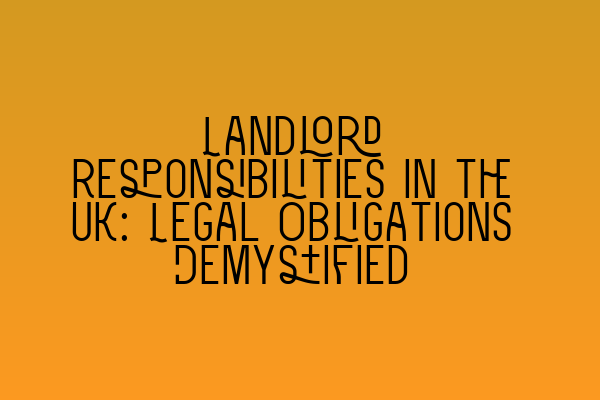Landlord Responsibilities in the UK: Legal Obligations Demystified
As a landlord in the UK, it is crucial to understand your legal obligations to ensure a smooth and compliant tenancy. Failing to meet these responsibilities can result in financial penalties, legal disputes, and damage to your reputation. In this article, we will demystify the landlord responsibilities in the UK and provide you with a comprehensive guide to navigate the legal landscape.
1. Providing a Safe and Habitable Property
One of the primary responsibilities of a landlord is to provide a safe and habitable property for your tenants. This means ensuring that the property meets all the necessary health and safety requirements. Regular maintenance and inspections should be carried out to identify and rectify any potential hazards or issues.
Additionally, it is important to provide appropriate facilities such as heating, hot water, and ventilation. The property should also comply with fire safety regulations, including the provision of smoke alarms and carbon monoxide detectors.
By fulfilling your duty to provide a safe and habitable property, you not only protect your tenants but also minimize the risk of legal action being taken against you.
SQE Preparation for Property Practice: Mapping Out Your Strategy
2. Maintaining the Property
Regular maintenance of the property is essential to ensure it remains in good condition and meets the required standards. This includes addressing any repairs or maintenance issues promptly. Failure to maintain the property can lead to tenant dissatisfaction and may result in legal action.
It is advisable to keep a record of all maintenance work carried out, including repair invoices, as evidence of your commitment to maintaining the property. This documentation can be useful in case of disputes or claims.
Updates in UK Property Laws: Key Changes and Implications
3. Protecting the Tenant’s Deposit
In the UK, landlords are required to protect their tenants’ deposits in a government-approved tenancy deposit protection scheme. This scheme safeguards the deposit and ensures its return at the end of the tenancy, provided the terms of the agreement have been met.
It is essential to adhere to the specific requirements of the chosen deposit protection scheme, including providing the tenant with the prescribed information within the required timeframe. Failure to comply can result in penalties and the inability to legally evict the tenant.
Legal challenges in property transactions: A comprehensive guide
4. Adhering to Anti-Discrimination Laws
Landlords have a legal obligation to adhere to anti-discrimination laws when selecting tenants. You must not discriminate against potential tenants on the basis of protected characteristics such as race, religion, disability, gender, or age.
It is advisable to have a clear and transparent tenant selection process in place, documenting your criteria and selection process to demonstrate fairness and compliance with the law.
Navigating Lease Laws in the UK: Essential Guidelines for Tenants and Landlords
5. Complying with Renting Regulations
There are specific regulations and requirements that landlords must comply with when renting out their property. These include obtaining the necessary licenses, carrying out gas and electrical safety inspections, and providing the tenant with a copy of the Energy Performance Certificate (EPC).
It is also vital to comply with tenancy agreement requirements, such as providing the tenant with an assured short-hold tenancy agreement and ensuring that any rent increases are conducted in accordance with the law.
Dominate Property Law Questions: Avoiding Common Pitfalls
Conclusion
Being a responsible landlord in the UK means understanding and fulfilling your legal obligations. By providing a safe and habitable property, maintaining it regularly, protecting the tenant’s deposit, adhering to anti-discrimination laws, and complying with renting regulations, you can ensure a positive and legally compliant tenancy.
For further guidance and information on property law and landlord responsibilities, our team at SQE Property Law & Land Law are here to assist you.
